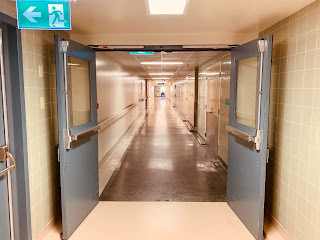Is Outpatient Joint Replacement Surgery Right for Me?
Having a hip or knee replacement and going home from the hospital the same day is becoming more common. The surgery is generally performed early in the morning, and the patient goes home at the end of the day.
Five years ago, outpatient joint replacement was almost unthinkable. But advances in technology, surgical technique and pain management over the past few years have made same-day hip or knee replacement a viable option for patients who meet certain criteria. During the pandemic, many people find this appealing since they leave the hospital more quickly and can spend their first night after surgery in the comfort of their own home.
These days, much smaller incisions and robotic-assisted joint replacement, which allows for ultraprecise positioning of the implant, benefit patients who wish to go home the day of surgery. A study in the Bone & Joint Journal in 2018 by researchers in the United Kingdom found that robotic-assisted total knee replacement was associated with decreased pain after surgery, improved early functional recovery and a shorter hospital stay.
A technique known as multimodal pain management has resulted in better pain control after surgery, another advantage for patients wishing to leave the hospital the same day. The technique uses various medications that target multiple pain pathways and generally lessens the need for opioid medications.
In general, recovery after knee replacement surgery can be more challenging than after a hip replacement. A patient having a simultaneous double knee replacement would not qualify for outpatient surgery. Those having a more complicated hip or knee replacement, or a revision surgery, would generally spend at least one night in the hospital.
Whether it’s a hip replacement or a knee replacement, patients should meet the following prerequisites if interested in same-day surgery:
• Motivation. It takes a highly motivated patient with a positive attitude. The patient should feel comfortable forgoing a night in the hospital where he or she would receive nursing care. A patient who is very anxious about surgery or experiencing a great deal of stress about recovery may not be a good candidate for same-day joint replacement.
• Good general health. People who have heart or lung issues, diabetes or sleep apnea would not qualify for outpatient joint replacement. They should be nonsmokers.
• Age. Patients in their 40s or 50s and 60s tend to be better candidates. People in their early 70s in very good general health may also be candidates.
• Appropriate home setting. Patients who wish to go home the day of surgery should have a home environment that has been set up for their return, with their bedroom and bathroom easily accessible on the first floor if possible. Patients who have stairs at home will practice proper stair climbing with physical therapy prior to discharge. We also recommend having a well-stocked refrigerator with foods that are easy to prepare.
• Support at home. A family member, friend or hired helper should be available to assist the patient overnight.
After a joint replacement at Hospital for Special Surgery (HSS), patients are carefully examined and interviewed by their medical team to ensure it is safe to discharge them. Patients who change their mind or do not feel comfortable going home have the option of spending more time in the hospital.
Before going home, individuals learn how to safely transfer in and out of both the bed and the car, and they receive detailed instructions regarding medications and other concerns after surgery. They can expect to receive at-home nursing and physical therapy services the next day.
Ultimately, outpatient joint replacement surgery is a choice that patients and their orthopedic surgeon make together after weighing the pros and cons. Even if someone qualifies, it’s an option, not a requirement. Everyone is different and should make a decision based on what makes them feel most comfortable.




Comments
Post a Comment